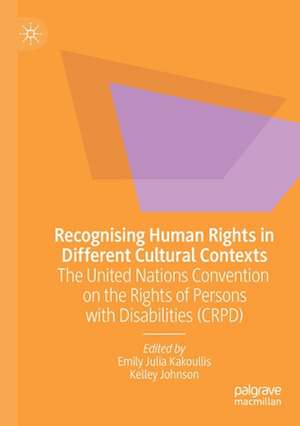Recognising Human Rights in Different Cultural Contexts: The United Nations Convention on the Rights of Persons with Disabilities (CRPD)
Editat de Emily Julia Kakoullis, Kelley Johnsonen Limba Engleză Paperback – 27 iun 2021
| Toate formatele și edițiile | Preț | Express |
|---|---|---|
| Paperback (1) | 783.81 lei 6-8 săpt. | |
| Springer Nature Singapore – 27 iun 2021 | 783.81 lei 6-8 săpt. | |
| Hardback (1) | 789.03 lei 6-8 săpt. | |
| Springer Nature Singapore – 27 iun 2020 | 789.03 lei 6-8 săpt. |
Preț: 783.81 lei
Preț vechi: 955.87 lei
-18% Nou
Puncte Express: 1176
Preț estimativ în valută:
149.100€ • 162.88$ • 125.100£
149.100€ • 162.88$ • 125.100£
Carte tipărită la comandă
Livrare economică 23 aprilie-07 mai
Preluare comenzi: 021 569.72.76
Specificații
ISBN-13: 9789811507885
ISBN-10: 9811507880
Pagini: 394
Ilustrații: XIX, 394 p.
Dimensiuni: 148 x 210 mm
Greutate: 0.49 kg
Ediția:1st ed. 2020
Editura: Springer Nature Singapore
Colecția Palgrave Macmillan
Locul publicării:Singapore, Singapore
ISBN-10: 9811507880
Pagini: 394
Ilustrații: XIX, 394 p.
Dimensiuni: 148 x 210 mm
Greutate: 0.49 kg
Ediția:1st ed. 2020
Editura: Springer Nature Singapore
Colecția Palgrave Macmillan
Locul publicării:Singapore, Singapore
Cuprins
1. Introduction.- Section I – Culture, Disability and the CRPD.- 2. Legal Culture and the CRPD.- 3. Anthropology, Disability and the CRPD.- 4. Recognising Cultural Diversity: Implications for Persons with Disabilities.- 5. A Personal Reflection on Indigeneity, Colonisation and the CRPD.- Section II – The Ratification Process: To Be Or Not To Be?.- 6. The Failure of the United States to Ratify the CRPD.- 7. The Long Road to Ratification: Ireland and the CRPD.- 8. A Consultative Culture? The Ratification Process for the CRPD in Cyprus.- 9. A Janus-Faced Affair: Sri Lanka’s Ratification of the CRPD.- Section III – Making Disability Human Rights Happen? Cultural Challenges to Implementing the CRPD.- 10. The ‘Transposition’ of Article 12 of the CRPD in China and its Potential Impact on Chinese Legal Capacity Law and Culture.- 11. Implementation of Article 19 of the CRPD in Hungary and its Impact on the Deinstitutionalisation Process So Far.- 12. Implementing Article 19 of the CRPD in NordicWelfare States: The Culture of Welfare and the CRPD.- 13. Article 30 of the CRPD as a Vehicle for Social Transformation: Harnessing the CRPD’s Potential for Persons with Intellectual Disabilities.- Section IV – Monitoring the CRPD: Resolving Conflicting Interests?.- 14. Was Ratification of the CRPD the High Watermark for United Kingdom Disability Rights? Ten Years of Monitoring Implementation of the CRPD.- 15. The Role of Disabled People’s Organisations in Promoting the CRPD in Indonesia.- 16. The Process of State Party Reporting to the CRPD Committee: The Indian Experience.- 17. Conclusion.
Recenzii
“This is an excellent edited collection, which will be a very useful resource for undergraduate and postgraduate students, and academics, plus DPOs and state policy makers. Its range of case- study examples provide a detailed critical account of the CRPD, its transformative potential, and the importance of state and local contexts and cultures, and the involvement of people with disabilities, in its adoption.” (Edward Hall, British Journal of Learning Disabilities, July 9, 2021)
Notă biografică
Dr Emily Julia Kakoullis is a Lecturer in Human Rights Law at the School of Law and Politics at Cardiff University in the UK. She has worked as a Researcher at the University of Exeter, University of Bristol and University of Maastricht. Prior to a career in academia Kakoullis worked as a Legal Researcher at the Ministry of Justice in the UK and for a disability non-governmental organisation in Cyprus.
Professor Kelley Johnson holds Honorary Professorial appointments at Deakin University and University of New South Wales (UNSW) in Australia. She is an internationally known scholar who has been a researcher and advocate with persons with disabilities for more than 20 years in Australia and internationally.
Textul de pe ultima copertă
This book explores the journey of the United Nations Convention on the Rights of Persons with Disabilities (CRPD) as it is interpreted and translated from International Human Rights Law into domestic law and policy in different cultural contexts. Beginning with reflections on ‘culture’, ‘disability’ and ‘human rights’ from different disciplinary perspectives, the work is then organised as ‘snapshots’ of the journey of the CRPD from the international level to the domestic; the process of ratification, the process of implementation, and then the process of monitoring the CRPD’s implementation in States Parties cultural contexts. Leading global contributors provide cutting-edge accounts of the interactions between the CRPD and diverse cultures, revealing variations in the way that the concept of ‘culture’ is defined. This collection will appeal to academics and students in Law and Socio-Legal Studies, Disability Studies, Policy Studies and Social Work, Sociology, Anthropology; and those training to be service providers with persons with disabilities.
Caracteristici
Breaks new ground by exploring how international law is translated into specific cultural contexts interdisciplinary in its focus with contributions from the disciplines of Law, Disability Studies and the Social Sciences Features international contributors from North America, Europe, Scandinavia, Australia, and Asia Draws together the work of people with disabilities, academics and policy practitioners, enabling different perspectives on the contribution of the CRPD and the way in which it has been enacted in different domestic contexts and cultures Is written in an accessible style and has a clear, readable format that can be equally used by academics, policy makers and government representatives in countries which have already ratified, or are considering ratifying, the CRPD
